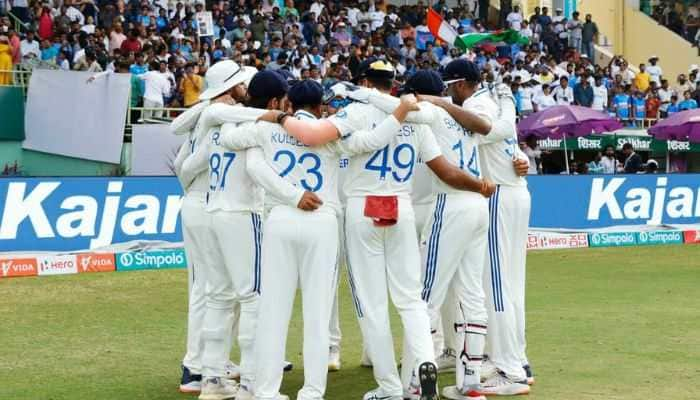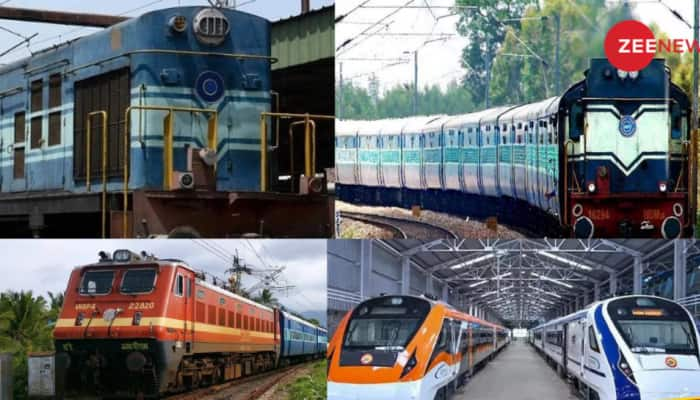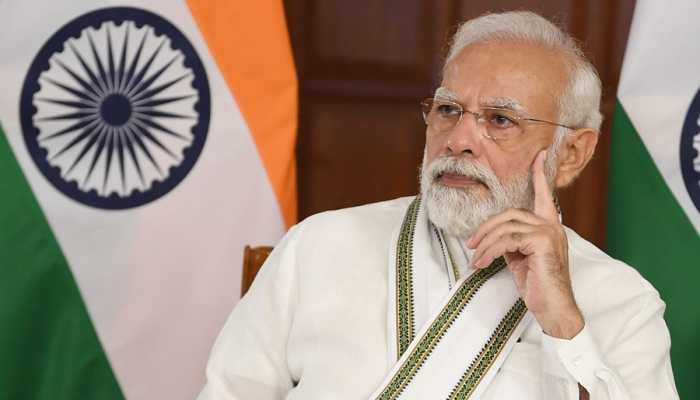
Prime Minister Narendra Modi turned 72 today. He was born and raised in Vadnagar of Gujarat.
Written By Zee Media Bureau | Last Updated: Sep 17, 2022, 01:00 AM IST | Source: Bureau
10

10

8

10
)
Narendra Modi, who served as chief minister of Gujarat for almost 13 years between 2001 and 2014 before assuming the post of the prime minister of India, has ushered in several policy changes in the last eight years.
Prime Minister Narendra Modi turned 72 today. He was born and raised in Vadnagar of Gujarat. Modi, who served as chief minister of Gujarat for almost 13 years between 2001 and 2014 before assuming the post of the prime minister of India, has ushered in several policy changes in the last eight years. These policy changes helped India maintain its economic growth momentum at a time when major economies of the world are stuttering. Narendra Damodardas Modi was born on September 17, 1950. As he celebrates his ninth birthday as Prime Minister of India, let's take a look at ten economic policies launched by him:
Goods and Services Tax: The GST is among the major reforms ushered in by the Modi government. It eliminated various taxes and brought in a regime of 'One Nation, One Tax'. The GST is a uniform indirect tax imposed on goods and services. It replaced taxes like central excise, additional duties of excise & customs, service tax as well as cesses and surcharges. GST was launched on July 1, 2017, in a ceremony held in the Central Hall of Parliament at midnight of June 30, 2017.
Aatmanirbhar Bharat: Self-reliant India is aimed at making the country aatmanirbhar or self-sustaining. PM Modi announced a special economic package for an Aatmanirbhar or self-reliant India while addressing the nation on May 12, 2020. The comprehensive economic package, valued at Rs 20 lakh crore, was equivalent to approximately 10% of India’s GDP. The package is focused on land, labour, liquidity and laws. The package is aimed at providing much-needed financial & policy support to the cottage industry and MSMEs in India. In his address, PM Modi outlined five pillars for building a self-reliant India-Economy, Infrastructure, Systems, Vibrant Demography and Demand.
National Infrastructure Pipeline (NIP): To help India in its transition from an agrarian economy to a service sector economy, a need for robust infrastructure was felt and thus the Modi government came out with the NIP. It was also estimated that India needs to invest about US$ 1.4 trillion for infrastructure development to achieve a GDP of US$5 trillion. Under the NIP, an investment of US$ 1.4 trillion was proposed for infrastructure projects across states. Roads, Urban and Housing, Railways, Power (Conventional and Unconventional) and Irrigation have been the focus area as part of the NIP as they amount to almost 80% of the funds. Various infrastructure projects under the NIP include national waterways development, Cochin international ship repair facility, rural footbridges, gas distribution projects, water supply projects, submarine optical fibre cable project, BTS installation project, medical colleges and sports complexes among others. A total of 9265 infra projects were taken under the NIP of which many have been completed and around 2198 are under implementation or on the verge of completion.
UDAY: The Ujwal DISCOM Assurance Yojana (UDAY) comes under the Ministry of Power launched and was approved by Union Cabinet on November 5, 2015. The scheme envisages the upliftment of DISCOMS through a financial turnaround, operational improvement, reduction of cost of generation of power, development of renewable energy and energy efficiency & conservation. It aims to make DISCOMS financially & operationally sound and at the same time increase the demand for power, reduction in stressed assets, availability of cheaper funds, increased capital investment, and ultimately, availability of 24*7 power for all at an affordable price.
Atal Pension Yojana (APY): Atal Pension Yojana is the guaranteed pension scheme administered by the Pension Fund Regulatory and Development Authority (PFRDA). The APY was launched to create a universal social security system for all Indians, especially the poor, the underprivileged and the workers in the unorganised sector. The scheme was earlier open to all Indians but now taxpayers have been barred from joining the scheme. The scheme was launched on May 9, 2015. The total enrollments under APY Scheme have crossed 4.01 crore as on March 2022 out of which more than 99 lakh APY accounts were opened during FY 2021-22. Under the APY, subscribers would receive a fixed pension of Rs 1000 – Rs 5000 per month, at the age of 60 years, depending on the contributions they made to the scheme.
Pradhan Mantri Jan Dhan Yojana (PMJDY): The PMJDY was announced by Prime Minister Narendra Modi in his Independence Day address on August 15, 2014. The PMJDY is a National Mission for Financial Inclusion to ensure access to financial services, namely, Banking/ Savings & Deposit Accounts, Remittance, Credit, Insurance and Pension in an affordable manner. Under the scheme, the account holders also get a free accidental insurance cover on RuPay cards of Rs 2 lakh (for accounts opened after 28.8.2018). In the last seven years, over 45 crore Jan Dhan Accounts have been opened and 85% of them are operative with a total deposit of Rs. 1.68 lakh crore. According to the government, the average deposit per account is Rs 3723, up nearly three times since 2015. A total of 31.64 crore RuPay cards have been issued to the PMJDY account holders till April 2022.
Ujjwala Yojana: The Pradhan Mantri Ujjwala Yojana was launched on May 1, 2016, while Ujjwala 2.0 was launched on August 10, 2021. The scheme provides for a deposit-free LPG connection for an eligible household with the financial assistance of Rs 1,600 per connection. It also facilitates free of cost the first LPG refill and a gas stove for the beneficiaries by public sector Oil Marketing Companies (OMCs). Due to the Ujjwala yojana, the LPG coverage has improved to 104.1% in 2022 as compared to 62% in 2016. According to the government, over 9 crore deposit-free LPG connections were distributed under the PMUY in the last 6 years. Over 14 crore free LPG refills were provided under Pradhan Mantri Garib Kalyan Package as well.
Pradhan Mantri Kisan Samman Nidhi Yojana (PM-Kisan Yojana): Prime Minister Modi launched the Pradhan Mantri Kisan Samman Nidhi (PMKISAN) from Gorakhpur in Uttar Pradesh on February 24, 2019. The scheme is aimed at supplementing the financial needs of land-holding farmers. Under the scheme Rs 2,000 is credited to the bank accounts of selected beneficiary farmers. As of February 2022, 11.78 crore farmers benefited from the scheme while Rs 1.82 lakh crore was released to the beneficiaries. Of these, Rs 1.29 lakh crore were released during Covid 19 pandemic.
Pradhan Mantri Garib Kalyan Yojana: Under the Pradhan Mantri Garib Kalyan yojana, the Modi government announced free food grains and cash payments to women and poor senior citizens and farmers. As on April 13, 2020, 32.32 crore beneficiaries were directly given cash support through Direct Benefit Transfer (DBT)amounting to Rs 29,352 crore under the package while 80 crore beneficiaries got free food grains. The PM-GKAY is under implementation from April 2020. The total expenditure under PM-GKAY has been around Rs 3.40 lakh crore so far.
Pradhan Mantri Jeevan Jyoti Bima Yojana and Pradhan Mantri Suraksha Bima Yojana: These are insurance schemes that offer life insurance coverage for death due to any reason. While the age bracket for the PMJJBY is 18 to 50 years, those in the age group of 18 to 70 years can avail of the benefit of the PMSBY. To avail of these benefits, the person must have a bank account and give consent for auto-debit of the insurance premium. The life cover under the PMJJBY is Rs 2 lakhs for one year stretching from 1st June to 31st May and will be renewable. In the case of the PMSBY, the risk coverage is Rs 2 lakh for accidental death and full disability and Rs 1 lakh for partial disability. The number of active subscribers enrolled under PMJJBY and PMSBY as of 31.3.2022 is 6.4 crore and 22 crore, respectively.